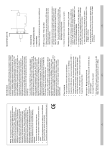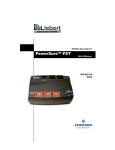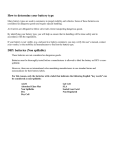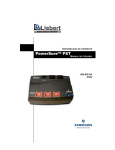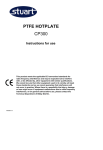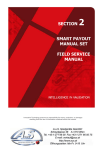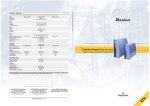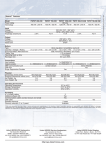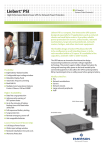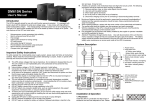Download PowerSure PST - Emerson Network Power
Transcript
PowerSure™ PST Quick-Start Guide for 500-650VA; 230V WHAT’S IN THE BOX TOP OF UPS • Quick-Start guide • PowerSure family user manual on CD (also at www.liebert.com) • Warranty card • USB cable (PAXXX-230U models only),1.8m (6ft.) • RJ-11 cord, 2.1m (7 ft.) • Two (2) 10A output power cords, 2.0m (6.6 ft.) LEFT SIDE OF UPS ** Black output receptacles (surge protection only) Data Line ** Protection Connectors Refer to Bottom for Cautionary Markings ** AC Inlet * Power ON/OFF/ Alarm Silence Circuit protector RIGHT SIDE OF UPS Mains/Battery Indicator (Green) * For more details, refer to the PowerSure user manual on CD. Pour de plus amples informations, voir le manuel Fault Indicator (Red/Green) * d'utilisateur de la gamme des produits PowerSure sur CD. ** Orange output recepFor details, see Para una información más detallada, consulte el manual del tacles (battery backup ***USB port * Controls and Indicators and surge protection) usuario de la familia PowerSure en el CD. (for PAXXX-230U models only) ** Installation Per informazioni ulteriori e più particolareggiate, consultare *** Communications il manuale dell'utente delle attrezzature PowerSure contenuto sul CD. Ausfuhrlichere Informationen finden Sie im Benutzerhandbuch der PowerSure-Familie auf CD. INSTALLATION Plug this type of equipment into black receptacles ONLY Read all safety, installation and operating instructions in the PowerSure family user manual on the included CD or at www.liebert.com before operating the UPS. Adhere to all warnings on the unit and in the manual. Inkjet Scanners Fax 1. Install the UPS indoors in a controlled environment, where it cannot be accidentally turned printers machines off. Place it in an area of unrestricted airflow around the unit, away from water, flammable liquids, gases, corrosives and conductive contaminants. Maintain an ambient temperature Plug computers, monitors, range of 0°C to 40°C (32°F to 104°F). routers and cash registers into 2. Connect equipment to the receptacles on the back of the PST with one of the two supplied orange receptacles output cables. Computers and monitors should be connected to the orange receptacles for battery backup and surge protection; other office machines that do not exceed the capacity of the UPS may be plugged into either of the two black receptacles, which provide surge protection only. 3. Connect an input cable removed from the load equipment to the PowerSure PST and to the mains supply socket. 4. Connect Phone/Fax/DSL/Internet/Modem devices to data line connectors. 5. Press and release the ON/OFF/Alarm Silence button to turn on the UPS. The UPS will beep and the Mains Indicator will illuminate (green). 6. Turn on connected equipment. CONTROLS AND INDICATORS This button controls output power to the connected load and has three functions: •Turns the PowerSure PST ON •Turns the PowerSure PST OFF •Silences PowerSure PST alarms TURN THE UPS ON: Press and release the main ON/OFF button to start the UPS. An audible alarm will sound briefly. TURN THE UPS OFF: When the PST is ON, hold the main ON/OFF button down for more than 2 seconds to shut it down. An audible alarm will sound briefly. SILENCE AN ALARM: When a UPS alarm is active, press and release the main ON/OFF button to silence the audible alarm (Exceptions: low battery, overload and overtemperature). DO NOT hold the button down for more than 2 seconds or the PST will shut down. CHECK THE PST’S CONDITION: Three status indicators on the front of the UPS illuminate to specify the status of the UPS (see Troubleshooting section for details). COMMUNICATIONS The PowerSure PST has a USB interface port for communication that will work with the builtin Microsoft Power Manager software on the user’s PC, if the PC is so equipped. It will provide UPS status and manages the automatic, orderly shutdown of the computer. The UPS (USB) communications meets HID standard, version 1.11. All USB models are compatible with Microsoft Windows 2000, Windows XP and Mac OS 10.2 or later. All USB models ship with a 6 ft. (1.8m) USB cable. SPECIFICATIONS Model Number PA500-230U PA500-230 PA650-230U PA650-230 500 / 300 650 / 360 168 x 250 x 95 (6.6 x 9.8 x 3.7) 168 x 250 x 95 (6.6 x 9.8 x 3.7) 238 x 350 x 142 (9.4 x 13.8 x 5.6) 238 x 350 x 142 (9.4 x 13.8 x 5.6) Model Rating VA / W DIMENSIONS: mm (in.) Unit WxDxH Shipping WxDxH WEIGHT: kg (lbs) 4.7 (10.4) Unit 5.7 (12.5) Shipping INPUT AC PARAMETERS 5.7 (12.5) Output Cord (3) IEC-320-C13 (orange) battery backup+surge protection (2) IEC-320-C13 (black) surge protection 2m (6.6 ft) detachable, w/IEC-320 (Wire Type: 1mm2, H05W-F 3G) Voltage (Battery 230VAC (±8%) Mode) 2.9 A 4.2 A Output Current Waveform (Battery Stepped Sinewave Mode) Frequency 50/60 Hz (±1 Hz) (Battery Mode) >100% Overload Warning Overload >110% Shutdown BATTERY PARAMETERS Type Quantity x Voltage x Rating Transfer Time Back-up Time: Full load Half load Recharge Time Valve-regulated, nonspillable, lead acid 1 x 12V x 5 Ah Operating Temperature 0°C to +40°C (+32°F to + 104°F) Storage Temperature -15°C to +50°C (+5°F to + 122°F) Relative Humidity 0% to 95%, non-condensing Operating Elevation Up to 3000 m (10,000 ft.) at 35°C (95°F) w/o derating Audible Noise < 40 dBA, at 1 meter 6.7 (14.8) 220J Surge Protection Rated Input 230VAC Voltage Voltage Range 180VAC - 264VAC (±6VAC) Without Battery Operation 47 - 63 Hz (±0.4 Hz) Frequency OUTPUT AC PARAMETERS Output Receptacles ENVIRONMENTAL 1 x 12V x 7 Ah 4 – 6 ms typical At 25°C (77°F), resistive loading, w/ fully charged batteries: 2 minutes 1 minute 8 minutes 8 minutes 12 hours to 90% rated capacity, after full discharge into resistive load AGENCY Safety EN50091-1-1, TUV/GS listed, CE Compliance Mark Surge EN61000-4-5, Level 3, Criteria A ESD EN61000-4-2, Level 3, Criteria A Susceptibility EN61000-4-3, Level 2, Criteria A Electrical Fast Transient/ Burst EN61000-4-4, Level 3, Criteria A Emissions EN50091-2, Class B Harmonics EN61000-3-2 Conducted Immunity EN61000-4-6 Flicker EN61000-3-3 Transportation ISTA Procedure 1A TROUBLESHOOTING TROUBLESHOOTING CHART The information below indicates various symptoms a user may encounter in the event the PowerSure PST experiences a problem. Use this information to determine whether external factors caused the problem. See Troubleshooting Chart for suggested remedy. If the UPS fails to operate properly, turn off the unit and repeat the steps in the Installation section of this manual. If the problem persists, refer to the chart below: 1. The Fault indicator illuminates, indicating the UPS detected a problem. 2. An alarm sounds, alerting that the UPS requires attention. The alarm can be silenced except for low battery, overload and overtemperature warning conditions. Fault Indicator Mains/Battery Indicator Problem Cause UPS will not start 3. Mains/Battery indicator may be illuminated as a diagnostic aid to the operator, as shown below: GUIDE TO STATUS INDICATORS Fault (Red) Mains/Battery (Green) + ! - Diagnosis/ Audible Alarm Normal Mode — ON UPS is operating in Normal Mode; no beep. Flashing Battery Test has been initiated; no beep. Flashing ON The unit is overloaded; beep every half-second ON ON — Flashing — ON — The UPS has failed; continuous Unit has shutdown due to overload; continuous beep The UPS shutdown due to failure; continuous beep Battery Mode — Flashing The UPS is operating in Battery mode; beep every 5 seconds. — Flashing UPS battery is low; beep every half-second Flashing ON Flashing Flashing UPS starts on battery, but will not switch to AC The unit is overloaded; beep every half-second The UPS has failed; continuous beep MAINTENANCE The PowerSure PST UPS requires very little maintenance. Follow these practices to prevent problems. CLEANING THE UPS The following will help ensure trouble-free operation for years: • Vacuum dust from the ventilation intake occasionally. • Wipe the cover periodically with a dry cloth. MAINTAINING BATTERIES The batteries are valve-regulated, nonspillable, lead acid and must be kept charged to retain their design life. The UPS continuously charges the batteries when connected to the mains supply, even while the UPS is switched off. Overload/ Short circuit Check the circuit protector on the side of the UPS. If it is tripped, reset it and restart the UPS. For further help, call your local dealer, Liebert representative or the Liebert Worldwide Support Group. UPS not plugged in Plug in power cord securely. Circuit protector tripped Reset the circuit protector and restart the UPS. Power not available at mains receptacle Have the mains receptacle checked by a qualified electrician. Input voltage below threshold Wait until the voltage rises to an appropriate level or have the mains receptacle checked by a qualified electrician. AC overvoltage Wait until voltage lowers to an appropriate level or have the mains receptacle checked by a qualified electrician. Overload/ Short circuit UPS shuts down, Fault Indicator lit UPS not providing expected backup time Solution Internal UPS fault Check the circuit protector on the rear of the UPS. If it is tripped, reset it and restart the UPS. If the problem persists, disconnect some of the equipment from your UPS—the total wattage of your equipment must not exceed the capacity of the UPS. For further help, call your local dealer, Liebert representative or the Liebert Worldwide Support Group. Overload Reduce load. Battery not charged due to a recent outage Recharge battery. WARRANTY REGISTRATION To register for warranty protection: • Visit the Quick Links section of our Web site at: http://www.liebert.com • Click on Product Warranty Registration and fill in the form. IF YOU HAVE ANY QUESTIONS, PLEASE CONTACT US AT: US: 800-222-5877 Outside the US: 614-841-6755 [email protected] When storing the UPS, it is recommended to plug in the UPS for at least 24 hours every four to six months to ensure full recharge of the batteries. SLI-23275QS (9/03) Rev. 0


